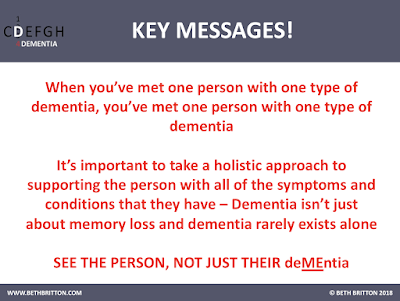This year Dementia Awareness Week is renamed Dementia Action Week to reflect the need for action for people affected by dementia rather than only focusing on awareness.
In this spirit, I’m sharing the ‘Key Messages’ from my dementia care and support training modules. The training, devised entirely by me and heavily based on personal experiences from my dad's life with dementia and the many other people I've met who are living with dementia, is something I've delivered to numerous frontline social care staff as a standalone learning experience or to supplement the bespoke training and mentoring that I provide to individual services and organisations.
I've never shared these materials online before, and I'm hoping by doing so now I will inspire positive action amongst health and social care providers who are supporting people living with dementia and their families.
Day 1: The basics of dementia
My first module is called 'What is dementia?' and covers:
- Facts and fiction
- Current statistics
- The different types of dementia
- The needs of minority groups - including BAME, LGBT, people with learning disabilities and younger-onset dementia
- The symptoms of dementia
- Other conditions with similar symptoms
- Living with long-term conditions alongside dementia
- Progression, ‘stages’ and the life course with dementia
- Dementia research
For me these key messages, whilst very basic to many of us, are something every person providing care and support for anyone affected by dementia should live and breathe by.
Of course, there is so much more to what is in a 3-hour training session than I could convey in a short blog, but to give you a flavour of what this is like in 'real life' the module is the start of opening up conversations about the types of dementia, symptoms and experiences of the people staff are currently supporting.
Everything I do asks learners to put themselves into the shoes of the person, so in this module learners think about what they might experience if they themselves were living with particular symptoms of dementia.
**ACTION FOR HEALTH AND SOCIAL CARE PROVIDERS**
PLEASE PRINT THE KEY MESSAGES IMAGE ABOVE AND PIN IT ONTO A NOTICEBOARD THAT ALL OF YOUR STAFF CAN SEE.
For more information on my training and mentoring consultancy work, please see my website: http://www.bethbritton.com.
Tomorrow (22 May 2018) I will look at 'Person and relationship centred care and support'.
Until then...
You can follow me on Twitter: @bethyb1886
Like D4Dementia on Facebook



No comments:
Post a Comment